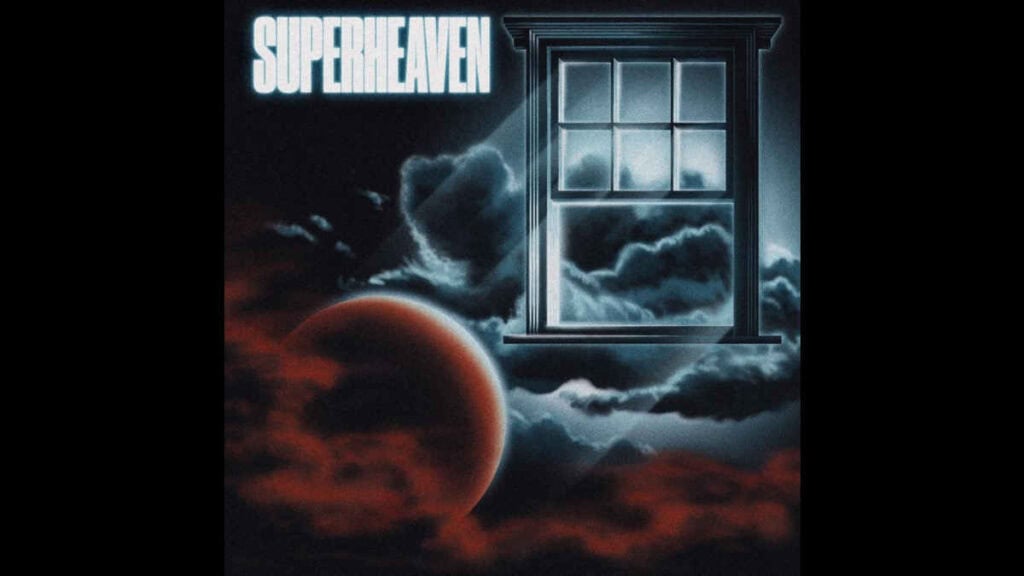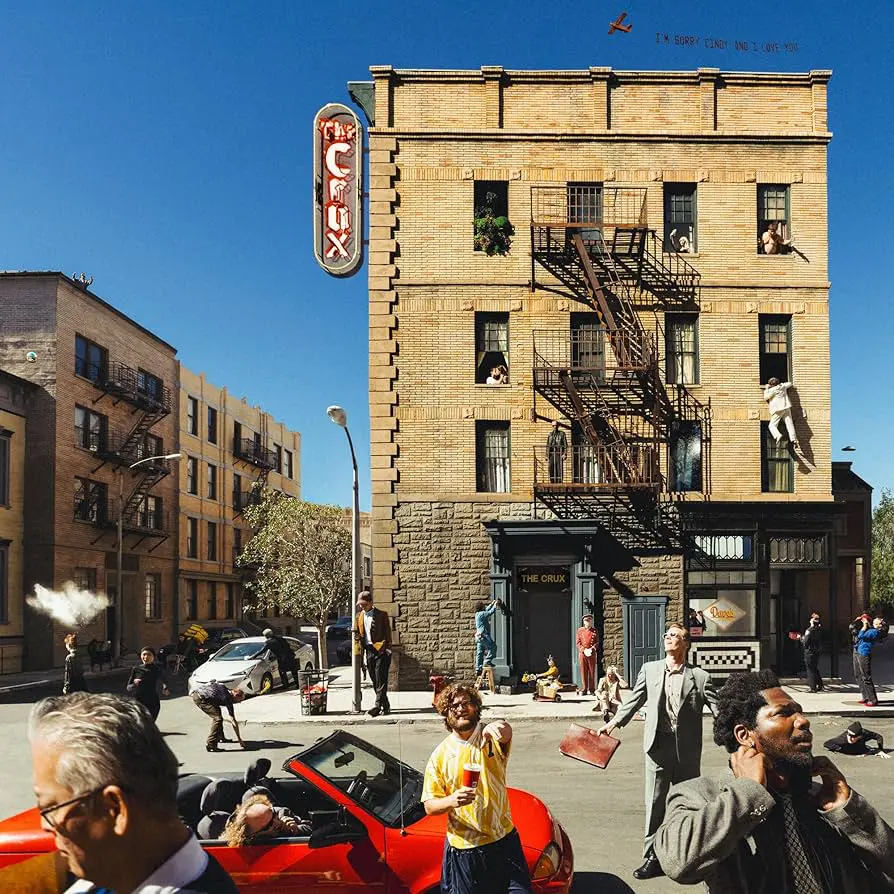Words: Callie Petch
 You can tell a lot about a beabadoobee album from how they open. 2020 debut Fake It Flowers exploded out of the gate with “Care,” a concussive blast of vintage 90s power pop that demonstrated the eager-to-please energy of a then-20-year-old ingenue capable of knockout moments but not quite able to sustain that momentum across a full LP. 2022 sophomore Beatopia creeped in with “Beatopia Cultsong,” awash in fuzzed-up whirling synths and campfire mantra singalongs yet lacking in structure; betraying a misplaced desire to craft a more complex album which, for all its highs, could get lost in its own head and bury underwritten tracks in overly busy production. This is How Tomorrow Moves, arriving almost exactly two years later, begins with “Take a Bite,” a radio-ready “Drive” rip with a chorus which sneaks up on you and is palpably a more confident and assured song than almost anything she’s released to date.
You can tell a lot about a beabadoobee album from how they open. 2020 debut Fake It Flowers exploded out of the gate with “Care,” a concussive blast of vintage 90s power pop that demonstrated the eager-to-please energy of a then-20-year-old ingenue capable of knockout moments but not quite able to sustain that momentum across a full LP. 2022 sophomore Beatopia creeped in with “Beatopia Cultsong,” awash in fuzzed-up whirling synths and campfire mantra singalongs yet lacking in structure; betraying a misplaced desire to craft a more complex album which, for all its highs, could get lost in its own head and bury underwritten tracks in overly busy production. This is How Tomorrow Moves, arriving almost exactly two years later, begins with “Take a Bite,” a radio-ready “Drive” rip with a chorus which sneaks up on you and is palpably a more confident and assured song than almost anything she’s released to date.
Despite being an overall fan of Beatrice Laus over her seven-year career, I will also admit that it’s been a bit of a tempered fandom where her obvious talent and bounds of potential only get realised in brief doses at a time. Fake It Flowers and Beatopia are not bad albums by any stretch of the definition, but they are frustrating ones. Undeniable bangers – “the perfect pair,” “Care,” “See You Soon,” “Yoshimi, Forest, Magdalene” – being crowded out by uninspired filler or baffling production choices that mean the whole can fail to leave much of an impression. In fact, I was starting to wonder if Bea was ultimately best in smaller slices than a full-album environment. Her 2021 Our Extended Play was better than many full-length albums released that year, and all three of her 2023 singles cleared a solid half of Beatopia, particularly the queer-y lounge collaboration “A Night to Remember” with Laufey.
Not that any of this stunted her ascent. In fact, given the way that much of the younger generation consume music nowadays, it may have helped since Bea’s no stranger to TikTok/YouTube virality; her very first original song, “Coffee,” famously doing so twice (once vanilla then again when sampled for powfu’s COVID-era hit “Death Bed”). Ever since the world chose to open up from the pandemic, Bea’s ascent has been continuous and ever-sharper, most recently encompassing legit Top 40 singles, Calvin Klein brand deals, and an opening slot on Taylor Swift’s culture-swallowing Eras Tour. This is How Tomorrow Moves, accordingly, is the Big Time Album. The one where a wide-eyed (Filipino-born) Brit jets off to America; shacks up with a Big Time Producer (Rick Rubin, arguably THE Big Time Producer); and sets out to make their widest, sunniest, poppiest crossover album to date. It’s a tale as old as time, one that several of her current and former Dirty Hit labelmates have indulged in themselves, and also one which throws up jumbled failures just as often as it does runaway successes.
Fortunately, we’re dealing with the latter. At the third time of asking, beabadoobee has finally put it all together and made her first great full-length. The palpable confidence of “Take a Bite” courses throughout all 14 of these songs, a cohesive journey through a gamut of vintage 90s pop-rock sounds with wormy hooks and biting lyrics. Where Beatopia could stray into disjointed showiness in its efforts to display Bea’s sonic range, Tomorrow’s various genre-hops keep within that pre-millennium drivetime radio aesthetic umbrella whilst managing to avoid flattening down each track’s individual edges.
Familiar Bea touchstones are here, of course. “California” is the kind of power pop/bubblegrunge ripper that few are doing better than her, whilst “A Cruel Affair” revisits the bossa nova sound of breakout hit “perfect pair” albeit with more of a Nouvelle Vague French touch. But the time overseas, and perhaps in the vicinity of Swift, has added an alt-country twang to several songs on here; single “Everseen” could be mistaken for a Kacey Musgraves number until the post-chorus horns and synth arrive on the scene. “Everything I Want” might be the sweetest song in Bea’s repertoire, a contentedly-earnest laze that musically journeys from the acoustic bedroom, to a sun-dappled Laurel Canyon with a pinging lead guitar line, and a light jazzy middle-eight. “Post” has the same period-pastiche alt-pop punch as her upcoming tourmates Momma but slathered in shoegaze fuzz. And, befitting the admission of closer “This is How it Went” to write songs just like him, the spectre of Elliot Smith and his penchant for a waltz guides a good third of the album; most obviously in “Coming Home.”
Rubin and longtime friend/collaborator Jacob Bugden’s production helps in making these songs pop like their inspirations. Whilst prone to that old Rubin issue of a mastering which causes the odd unnecessary redline-peaking on tracks which have no reason to, this is the first Bea release where I don’t have any major issues with the sound of the songs. They do a solid job of foregrounding the central hooks and melodies, making climactic moments sound absolutely massive, whilst still allowing for bits of muck to seep into the edges. “One Time” is a particular beneficiary of this much-improved production job, beginning as a swaying singalong readymade for sold-out theatres until a Graham Coxon-esque anti-solo screams in during the bridge to transition into a snotty gang chorus outro (which could’ve stood to last a little longer).
That highlight also draws attention to Bea’s much improved lyricism and performance. Not to say she hasn’t been capable of the odd BAR on previous releases, but I’ve mostly found her lyrics and vocal delivery up to now to work as part of a track’s sonic fabric rather than standout elements in their own right. Tomorrow sees that change for the better. Bea still prefers the lilting vocal style that brought her to the party, but her pen game is more cutting and self-critical in a way which enhances the overall impact, perhaps a consequence of Rubin & Bugden’s production mixing her to the front and therefore inviting more scrutiny. “Real Man” has a smoky jazz café ambience and over-it delivery which makes her lyrics about kissing off a neglectful waste of a man that much sweeter; you can practically hear the smirk on “I guess no-one ever taught you how to be a real man.” “Beaches” nails the Sixpence None the Richer lodestar with Bea’s most relaxed vocals to date, matching the song’s lyrics about the comforting blue of life in Malibu. Meanwhile, “The Man Who Left Too Soon” explores the compartmentalised grief of losing your father with the lovely notion of “at least we look at the same moon.”
Fourteen tracks is arguably pushing it a tad, mostly due to closing on three straight low-energy acoustic numbers, and the torchlight piano ballad “Girl Song” is a little too musically sappy for my tastes. But, unlike Fake It and Beatopia, I can feel myself returning to the whole of This is How Tomorrow Moves after filing this review rather than just the highlights. There are many tangible reasons for this jump in quality – the improved lyricism, an admitted newfound love of bridges (always part of the best pop songs), the Rick Rubin touch, better mixing and production. But, more than anything, I’d put it down to Bea finally growing into herself.
The potential for her to make a properly great album has been there ever since the Space Cadet EP, but not every 19-year-old can come right out the gate and make good on that potential. Often, a fast-tracked ingenue has to learn how to refine that potential on the job, honing their craft and growing their confidence in the harshness of the spotlight. You just have to keep the faith that, one day, the potential gets fully realised. With This is How Tomorrow Moves, beabadoobee finally pays off that faith with her most confident, charming, and rewarding collection of songs to date. Take a bite.






